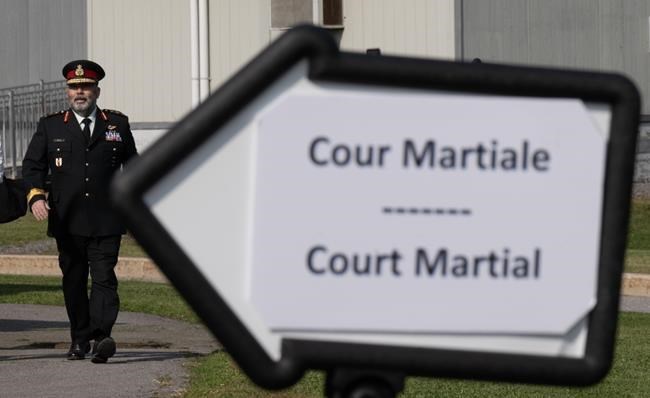
Lt.-Gen. Steven Whelan makes his way to a court martial proceedings, Thursday, September 28, 2023 in Gatineau. THE CANADIAN PRESS/Adrian Wyld
Republished September 28, 2023 - 2:54 PM
Original Publication Date September 28, 2023 - 10:36 AM
OTTAWA - The military judge presiding over a court martial for Lt.-Gen. Steve Whelan has decided the emails at the centre of the case are not admissible as evidence.
Cmdr. Martin Pelletier presided over a hearing Thursday afternoon to determine whether the emails could be admitted as part of the prosecution's case.
Earlier Thursday, he imposed a publication ban on that hearing and on the emails themselves until such time as they are either admitted into evidence or the proceedings are over.
Pelletier told the court it was a challenging decision to impose the ban.
"There come times in the judiciary when you have to fly by the seat of your pants, and this is one of the cases," Pelletier said as he read his decision Thursday afternoon.
Military prosecutors wanted to enter into evidence 10 packages of email correspondence between Whelan and the complainant in the case, who has been testifying this week. The defence argued that the emails are not relevant to the charge.
Whelan has pleaded not guilty to one charge of conduct to the prejudice of good order and discipline for improperly changing a performance review, while a second charge relating to sexual misconduct has been dropped.
The charges stemmed from a complaint made by a woman who said Whelan sent her inappropriate and flirtatious emails.
The Canadian Press is not naming the complainant because of the nature of the allegations.
Defence lawyer Phillip Millar had asked Pelletier to impose a time-limited publication ban on the emails so that lawyers can argue over whether they should be admitted as evidence.
Whelan is accused of having changed the complainant's performance report in 2011 while they were on tour together in Jerusalem.
Court heard from retired Col. Ron Ubbens on Monday, who said he wrote two versions of the complainant's performance evaluation report that year and she was unhappy with both of them.
Ubbens testified the woman felt Whelan was punishing her, and she threatened to go to a senior commander with emails from him to prove their relationship was inappropriate unless her score was improved.
After hearing that, Ubbens told the court, Whelan asked him to improve her score. Whelan emailed Ubbens and instructed him to "make her go away."
The complainant testified Wednesday that Whelan was task force commander on the mission and helped get her deployed in a position that was slated for someone of a higher rank.
She said she remembered Ubbens telling her that Whelan wrote the first performance report, which she considered to be sub-par. She said she believed Whelan was punishing her because she refused an invitation to go to a meeting in his private hotel room.
She said Ubbens later rewrote the report to be more positive. She added she did not recall telling him about the emails from Whelan but said on the stand that she remembers being "very emotional."
The defence has already conceded that Whelan was worried those emails could damage his career and his marriage. On Monday, the court heard that Whelan told Ubbens: "I knew I made a mistake with those emails."
As a result, Millar said it's clear Whelan thought they could be damaging, and he argued on Wednesday that allowing media to print what's in the emails could make the court complicit in what he characterized as attempted extortion by the complainant.
Military prosecutor Maj. Max Reede and a lawyer hired by the Globe and Mail argued on Wednesday that the risk of embarrassment is not a reason to override the open court principle.
"Embarrassment isn't the issue here," Pelletier said Thursday, adding he agreed that it does not meet the legal test to order a publication ban.
Pelletier said the court was in "a little bit of a Catch-22," because he needed to read the emails in order to determine whether they were relevant to the prosecution's case, and in order for him to do that, they would need to be entered into evidence.
"Making these emails public by admitting them as an exhibit ... will arguably allow the prosecution to show sexual misconduct was committed even in the absence of a decision," he said.
Pelletier ruled there is a risk that a reasonable observer may think the courts and media are being used to allow the now-withdrawn charge of sexual misconduct to be tried in the court of public opinion.
He noted the defence is arguing that Whelan was targeted for political reasons at a time when the Canadian Armed Forces was in crisis.
Starting in early 2021, a string of high-profile military members were removed from their posts after being accused of sexual misconduct. That led to an external review by former Supreme Court justice Louise Arbour, who made 48 recommendations to reform the military's culture.
When media reported that Whelan was under investigation by military police in October 2021, he stepped aside from his role as head of military personnel. He has been on paid leave ever since.
This report by The Canadian Press was first published Sept. 28, 2023.
News from © The Canadian Press, 2023